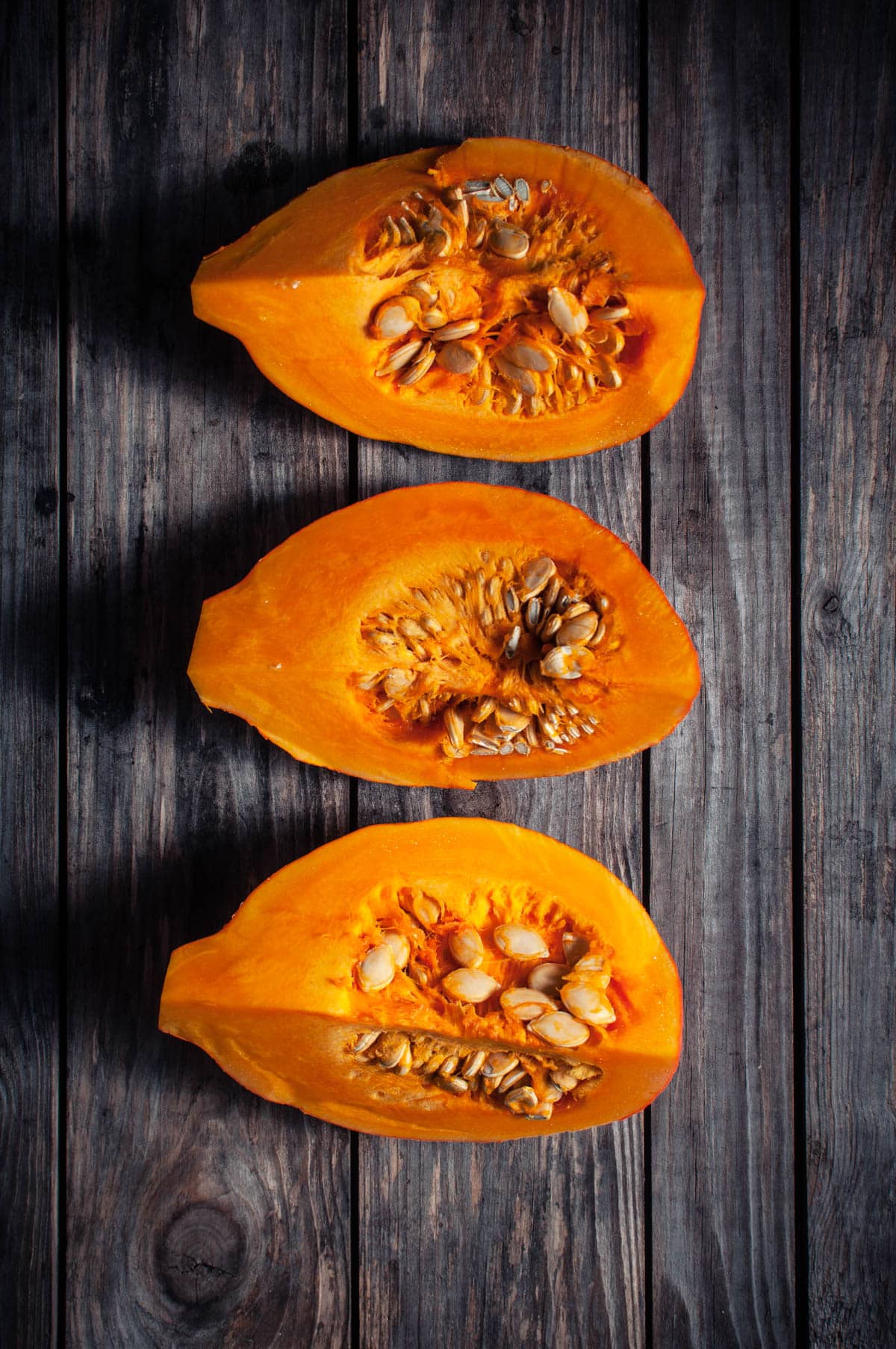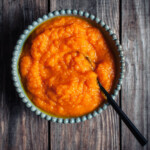Homemade Healthy Pumpkin Puree – Oven Roasted
You can make homemade pumpkin pure with very little effort by roasting cut pumpkin in the oven and then pureeing it. Pumpkin pure is a basic ingredient for all sorts of sweet pumpkin treats.

The self-made pumpkin puree contains nothing but pumpkin and is therefore very versatile and healthy.
Roasted pumpkin puree is extremely easy to cook. No cumbersome chopping and peeling are required.
Cut the pumpkin in half, remove the seedy parts with a spoon, and put the halves in the oven. No matter what size is up or down, the result is the same – it will roast.
I usually cut the pumpkin in smaller wedges, but not even that is necessary.
Once the roasted pumpkin is soft, take it out of the oven and cool for 10 minutes. Then cut the peel off, or even easier, scrape the pumpkin flesh from the peel with a spoon, and make puree!
If you have a rich pumpkin harvest from your garden, making puree is a great way to preserve it. Cool the puree and freeze it in freezer bags and thaw in the fridge.

What kind of pumpkin is suitable for pumpkin puree?
I usually use Hokkaido squashes. They are the right size and they are available here in all grocery stores.
Almost any ordinary pumpkin or squash will work.
Note: I haven’t tried spaghetti squash, but I don’t think that in particular is suitable for puree.
How to puree roasted pumpkin?
I have tried a blender, food processor, immersion blender, fork and electric whisk.
The blender didn’t quite work; the other tools did. I have just an ordinary blender, not a highspeed one like Vitamix. I should have added water to help the blender run smoothly, but the puree will get too wet if any water is added.
A fork worked too. It just needs some elbow grease, and the result is not super silky, but definitely better than with a blender.
In my opinion, the most convenient tools for making this puree are a food processor and an electric whisk.
They both make smooth and silky puree in no time without you having to sweat because of an exercise of heavy whisking or without losing your mind scraping the edges of a blender for 30 minutes.
How to store pumpkin puree?
The puree keeps in the fridge for about three days. You can freeze it for up to 8 months.
Why make homemade puree?
It’s healthy.
It’s easy.
It’s egological.

Nordic notes on pumpkin puree
Pumpkins are not a thing here in Finland. They do grow here, obviously, and are grown, but the number of typical Finnish pumpkin recipes is almost non-existent.
Autumn 2021 was the first year here that people did something other than just carving with pumpkins, in my opinion. Butternut squash has been around for some time, but that’s about it.
When I was a kid, the only pumpkin food I knew (for a very long time) was a pickled pumpkin.
So no typical Scandinavian recipes to share or local curiosities to present.
These were some very boring Nordic notes, I must admit.
Homemade Pumpkin Puree
Ingredients
- 1 medium pumpkin
Instructions
- Heat the oven to 180 C / 375 F.
- Cut the pumpkin in half.
- Use a spoon to scrape out the seeds.
- You can cut the halves into wedges if you want.
- Put the pumpkin on a baking tray and roast in the oven for 30-40 minutes until the pumpkin is soft.
- Let cool for about ten minutes.
- Carve the pumpkin flesh from the skin into a food processor.
- Pulse until you have a smooth puree

